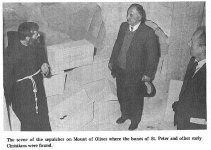Right Divider
Body part
Yes and no.So when John the Baptist said Jesus would baptize with the Holy Spirit, was this the Kingdom Gospel?
The gospel of the kingdom is specifically that the kingdom was "at hand".
That God would baptize Israel with the Holy Ghost and with fire was already known, because it is recorded in scripture. The baptism of fire is the time of Jacob's trouble. It is a refining fire.
Zech 13:7-9 (AKJV/PCE)
(13:7) ¶ Awake, O sword, against my shepherd, and against the man [that is] my fellow, saith the LORD of hosts: smite the shepherd, and the sheep shall be scattered: and I will turn mine hand upon the little ones. (13:8) And it shall come to pass, [that] in all the land, saith the LORD, two parts therein shall be cut off [and] die; but the third shall be left therein. (13:9) And I will bring the third part through the fire, and will refine them as silver is refined, and will try them as gold is tried: they shall call on my name, and I will hear them: I will say, It [is] my people: and they shall say, The LORD [is] my God.
Mal 3:1-4 (AKJV/PCE)
(3:1) Behold, I will send my messenger, and he shall prepare the way before me: and the Lord, whom ye seek, shall suddenly come to his temple, even the messenger of the covenant, whom ye delight in: behold, he shall come, saith the LORD of hosts. (3:2) But who may abide the day of his coming? and who shall stand when he appeareth? for he [is] like a refiner's fire, and like fullers' soap: (3:3) And he shall sit [as] a refiner and purifier of silver: and he shall purify the sons of Levi, and purge them as gold and silver, that they may offer unto the LORD an offering in righteousness. (3:4) Then shall the offering of Judah and Jerusalem be pleasant unto the LORD, as in the days of old, and as in former years.

